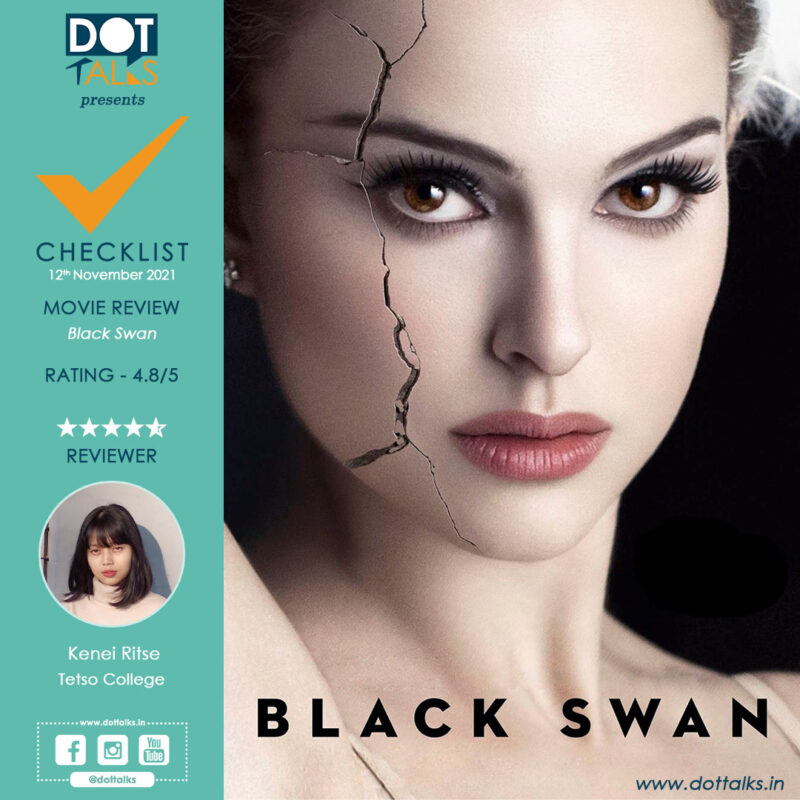| Name of the Movie | Black Swan |
| Starring | Natalie Portman, Vincent Cassel, Mila Kunis, Barbara Hershey, Winona Ryder |
| Director & Year of Release | Darren Aronofsky (2010) |
| Studio | Cross Creek Pictures, Protozoa Pictures, Phoenix Pictures, Dune Entertainment |
CHECKLIST RATING: 4.8/5
REVIEWER: Kenei Ritse, BA 1st Semester, Department of Psychology, Tetso College
Once a while there comes a psychological drama that blows our mind. Black Swan is less about ballet than the slow mental breakdown of an artist who takes her art too seriously. It is the tale of an artist seeking greatness but her hunger for perfection drives her insane.
Darren Aronofsky’s Black Swan is personally one of my favourite movies. From the cinematography, the aesthetics, the script to the great casting, what’s not to love about it. The Black Swan delivered a really dark and extreme vision of human beings and made it surprisingly relatable. The movie is beautiful yet frightening depiction of Mental Disorders.
The protagonist Nina (Natalie Portman) is a ballerina who fights to win the starring role in Tchaikovsky’s Swan Lake. She lives in a small apartment in NYC with her mother Erica Sayers( Barbara Hershey) who is narcissistic and spend all of her time painting pictures of herself, she did not respect Nina’s privacy and thought of her more like a way to fulfil her lost dreams, like a human vessel for her desires than a daughter. Thomas Leroy (Vincent Cassel), the beast is well known for having affairs with his dancers. He is an arrogant, intimidating and dominant character. Nina has to play both the White Swan and the Black Swan for Swan Lake. She has mastered the white swan part of the role this is because to her the role comes naturally. The white swan is pure, fragile, innocent, it symbolises the child side of Nina. She is the white swan. But she fails in embodying the Black Swan. This role is wild and is opposite of the White swan.

The Black Swan is devious and evil and everything Nina is not. She’s still a child and the Black Swan is a woman. There comes Lily (Mila Kunis) who is sexy, confident and bold. She is the Black Swan. Therefore, Nina becomes insecure and desires to master the role of the Black Swan which slowly leads her into self-destruction. Nina begins having psychotic breaks, she suffers visual hallucinations related to bodily injury and metamorphosis in her own and other people’s figures. She develops anxiety disorder with obsessive compulsive disorder (OCD), suffers from Maniac Bipolar Disorder alongside with anorexia, bulimia and schizophrenia. She “discovers” scratches and bleeding on her body seemingly derived from self-injury. She starts doing drugs and hallucinates having sex with Lily.
Nina’s madness crescendos when she maybe murders Beth (Winona Ryder); who was like a perfect role model to her and injures her mother and hallucinates her most vivid transformation into a swan. She did not realise that the two persona the White Swan (good) and the Black Swan (bad) could co-exist together. At the end, she finally embodies the Black Swan by killing the White Swan (herself). Her death was hence PERFECT to her.
I feel this movie is a beautiful depiction of the emotional and psychological stress that unravels from a person who has no sense of self but has to conform to unachievable perfection. The evolution of the Black Swan at the demise of White Swan is a running theme in many aspects of contemporary life. To achieve excellence in any art form will always make you balance precariously on the beam of insanity. To find yourself you need to realise you are lost.
I adore how the binary polar opposites are contrasted but then are meshed in a linear fashion to leave us in a state that questions our own reality. This movie is an epic masterpiece. Cinematic literacy at its greatest.
CHECKLIST is a review column initiated by Tetso College that aims at giving students, reviewers and writers a platform to review and reflect upon books, movies, television shows, documentaries, magazines, restaurants and catering services, games, software, and product reviews. The reviews should be a reflective writing encompassing the writer’s opinions about the subject matter while avoiding unprecedented subjective bias. This is an unsponsored review column. The views expressed here do not reflect the opinion of the Institution. Type your review in a Google Docs or MS Word document and email it to dottalks@tetsocollege.org.

